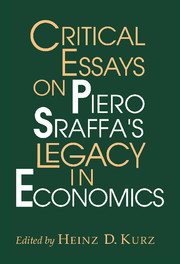Book contents
- Frontmatter
- Contents
- Preface
- List of contributors
- Part I Introduction
- Part II Returns to scale, demand, money and interest, and the classical tradition
- 3 Sraffa's hits and misses
- 4 Sraffa on demand: a textual analysis
- 5 Malthus and the corn–profit model
- 6 The Hayek–Keynes–Sraffa controversy reconsidered
- Part III Long-period theory and the problem of capital
- Part IV Intertemporal equilibrium theory and the problem of capital
- Mathematical Note by Michele Tucci
- Author index
- Subject index
4 - Sraffa on demand: a textual analysis
Published online by Cambridge University Press: 05 June 2012
- Frontmatter
- Contents
- Preface
- List of contributors
- Part I Introduction
- Part II Returns to scale, demand, money and interest, and the classical tradition
- 3 Sraffa's hits and misses
- 4 Sraffa on demand: a textual analysis
- 5 Malthus and the corn–profit model
- 6 The Hayek–Keynes–Sraffa controversy reconsidered
- Part III Long-period theory and the problem of capital
- Part IV Intertemporal equilibrium theory and the problem of capital
- Mathematical Note by Michele Tucci
- Author index
- Subject index
Summary
…, I have taken the course to express myself in terms of Number, Weight or Measure, to use only Arguments of Sense and to consider only such causes as have Visible Foundations in Nature: leaving those that depend upon the mutable Minds, Opinions and Appetites, Passions of particular Men to the consideration of others, (from the Preface to Political Arithmetik by William Petty)
Introduction
This chapter provides a textual analysis of the relevant works by Sraffa (1925, 1926, 1960) on demand. A letter to Asimakopulos dated 11 July 1971 and partially published by him (see Asimakopulos, 1990) will also be analysed. In Sraffa's writings it is not difficult to find passages that refer to the ‘theory of competitive value’ which ‘is inspired by the fundamental symmetry existing between the forces of demand and those of supply’ (Sraffa, 1926, p. 535):
Anyone accustomed to think in terms of the equilibrium of demand and supply may be inclined.…
(Sraffa, 1960, p. v)However, anyone who wants to find in those writings a quotation against the concept of ‘demand’ or even the concept of ‘demand function’ will be disappointed. I will argue that Sraffa was not of the opinion that demand does not matter but, on the contrary, that demand based on preferences (utility) is not a solid base on which to erect a theory of value and distribution. His aversion to arguing in terms of ‘mutable Minds, Opinions and Appetites, Passions of particular Men’ in economic analysis was not new, and can indeed be traced back to Petty (cf. the motto of this paper).
- Type
- Chapter
- Information
- Critical Essays on Piero Sraffa's Legacy in Economics , pp. 181 - 197Publisher: Cambridge University PressPrint publication year: 2000
- 5
- Cited by



